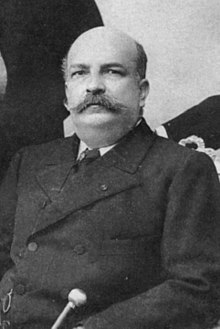Baron of Rio Branco
|
His Excellency The Baron of Rio Branco |
|
|---|---|

The Baron of Rio Branco in 1898
|
|
| Minister of External Relations | |
|
In office 3 November 1902 – 10 February 1912 |
|
| President |
Rodrigues Alves Afonso Pena Nilo Peçanha Hermes da Fonseca |
| Preceded by | Olinto de Magalhães |
| Succeeded by | Lauro Müller |
| 2nd Academic of the 34th chair of the Brazilian Academy of Letters | |
|
In office 1 October 1898 – 10 February 1912 |
|
| Preceded by | Pereira da Silva |
| Succeeded by | Lauro Müller |
| Personal details | |
| Born | José Maria da Silva Paranhos Júnior 20 April 1845 Rio de Janeiro, Empire of Brazil |
| Died | 10 February 1912 (aged 66) Rio de Janeiro, Brazil |
| Nationality | Brazilian |
| Political party |
Conservative Party (until 1889) Independent (from 1889) |
| Spouse(s) | Marie Philomène Stevens |
| Alma mater | Faculty of Law of Recife |
| Profession | Diplomat |
| Religion | Roman Catholic |
José Maria da Silva Paranhos, Jr., Baron of Rio Branco (in Portuguese:Barão do Rio Branco) (April 20, 1845 – February 10, 1912) was a Brazilian diplomat, geographer, historian, monarchist, politician and professor, considered to be the "father of Brazilian diplomacy". He was the son of famous statesman José Maria da Silva Paranhos, Sr. The Baron of Rio Branco was a member of the Brazilian Academy of Letters, occupying its 34th chair from 1898 until his death in 1912. As a representative of Brazil, through his outstanding diplomacy, he managed to peacefully resolve Brazil's border disputes with its South American neighbours.
In 1889, Emperor Pedro II of Brazil granted him the Brazilian nobility title Baron of Rio Branco (Barão do Rio Branco), a few days before the Proclamation of the Republic. Rio Branco nonetheless continued to use the title throughout his life, despite governmental prohibition, because of his monarchist beliefs and in respect for his father. Being a monarchist, however, was no impediment for his success as a diplomat: the Baron of Rio Branco reached the heights of his career during the Republic, when he acted as Minister of Foreign Affairs for 10 years and settled all of Brazil's remaining border disputes by peaceful means.
Rio Branco began his political career as a congressman in the House of Commons. From 1876 on, he was the Brazilian Consul General in Liverpool, England. He was also the Brazilian Ambassador in Berlin in the beginning of the 20th century.
Rio Branco's most important legacy to Brazil was his successful effort, as Minister of Foreign Affairs, in defining the country's borders with all of its neighbours. He was appointed Minister of Foreign Affairs in 1902 and retained office until 1912, under four different Presidents, a feat unequalled in Brazilian history.
...
Wikipedia
